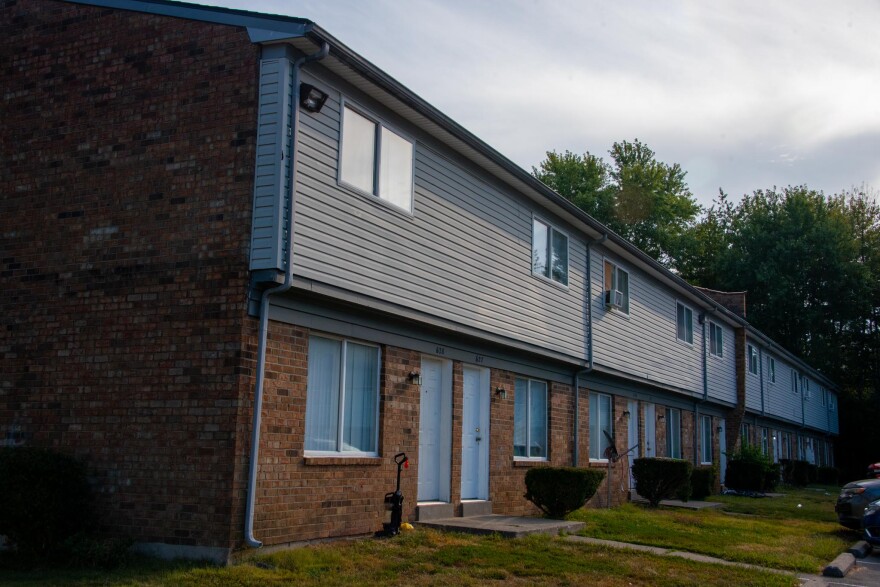Situated southeast of Muhammad Ali International Airport, Poplar Hills is one of 83 home-rule cities in Jefferson County. It has a population of 380. And the only thing inside its boundaries is a large apartment complex that looks like it’s seen better days.
Some windows in the complex have plywood boards in them, and there’s a community pool full of green stagnant water. Most residents, like Mary Rodriguez, have no idea the city even exists.
“Poplar Hill? No sir,” Rodriguez replied when asked if she had heard of the city. “We’re on Poplar Level road though.”
Other residents like Roger Carmona, know Poplar Hills as a place he’s seen on Google Maps.
“All this area is Poplar Hills, look,” Carmona said, pulling out his phone. “We’re in Poplar Hills, brother.”
So why does Poplar Hills exist anyway?
Denise Drexler became the city’s clerk and treasurer in 1985. She said before her decades-long tenure, Poplar Hills was much larger, but was whittled away during the so-called “annexation wars,” when suburban cities inside Jefferson County fought each other for residents. Before long, all that was left of Poplar Hills was an apartment complex.
“They kept annexing and annexing…until we were just left with an apartment complex and two other businesses,” Drexler said. “That was it. And of course, the only citizens of Poplar Hills were the residents of the apartments.”
Possibly the last mayor of Poplar Hills, Grayson Flood Jr., lived in those apartments for 30 years. He said even when he was mayor, the city government was largely pointless. Case in point: Flood said he didn’t even run to be mayor.
“I was contacted by the state board of elections and told that I had won in a write-in [ballot],” he said.
But Flood and Drexler say, despite the futility, they embraced their roles and tried to make life better for residents.
“We acted as a liaison between the apartments and the residents…did beautification projects, neighborhood watches,” Flood said. “When we would have law enforcement events or medical or fire emergencies I would act as representative of the city.”

By the 2010s, they were ready to hang up their titles, but nobody else seemed interested in running for office.
Flood said they spent years trying to figure out how to legally dissolve the city. Meanwhile, the state kept sending money for roads – even though the only road was private and not the city’s.
“I kept calling them, telling them we don’t have a road, we don’t need this money,” Drexler said. “They’re like ‘Well there’s nothing we can do about it.’”
Flood and Drexler eventually moved on from their posts at the start of 2015 without finding replacements. Drexler said she still has access to those city bank accounts with more than $130,000 dollars in tax revenues and road funds. She tried getting the state to take the money, but nobody seemed to know how to handle it.
Recently, while she checked the account balances, she found another surprise.
“Oh my gosh,” she said, looking at the account transactions for the first time in a while. “It looks like I’m getting a seven dollar and eight cent deposit from the Kentucky Finance [Cabinet]. I have no idea what that is.”
How do you dissolve a city anyway?
For years, cities in Kentucky could be dissolved by a vote of residents or action from a circuit court. But how do you do that if nobody knows a city exists? It’s a question the state government grappled with not just for Poplar Hills, but cities scattered across the state.
In 2022, the Kentucky General Assembly passed a law that could finally dissolve these “ghost” cities that no longer have officials or functioning governments. Every city in Kentucky was required to send the name of current city officials and their contact information to the state.
Brandon Gibson, a staff attorney with the Kentucky Department for Local Government, said the exercise amounted to an administrative pulse check.
“If they didn’t provide basic city information…then DLG could actually go through and do the administrative dissolution of the cities,” he said.
After multiple requests for information with no response, five Kentucky cities are now slated for dissolution: Poplar Hills, Blandville, Monterrey, South Park View and Vicco.

As part of the dissolution process, DLG holds public hearings to announce facts and take comments from the public. So far, nobody has shown up to a meeting.
“The one we did in Blandville took…17 minutes,” said Scott Sharp, a hearing officer for DLG.
At the 14-and-a-half minute hearing over Poplar Hills’ dissolution in August, Sharp played the part of town crier, reading a litany of required legal codes – just the first act in a months-long bureaucratic process to dissolve the city.
Then he opened the floor for comment from a sea of empty chairs.






